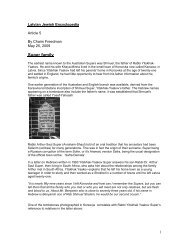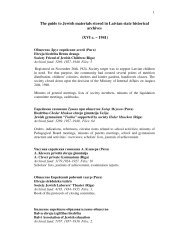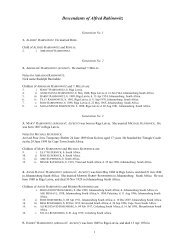Small Riga Ghetto
Small Riga Ghetto
Small Riga Ghetto
You also want an ePaper? Increase the reach of your titles
YUMPU automatically turns print PDFs into web optimized ePapers that Google loves.
231<br />
III.<br />
The main contingent of the prisoners in the camp consisted of Poles. But besides<br />
them, all the peoples of the earth were represented. One could even meet<br />
people from Tunis and Algiers. From afar we saw a large group in uniform. It<br />
consisted of Norwegian policemen. We heard that they had been brought here<br />
because they had tried to revolt. But their situation was better than ours. The<br />
world cared about them. They sometimes received packages from the Red<br />
Cross! We seemed to have nobody: no one cared about us, and the world<br />
seemed to have forgotten us entirely!<br />
Our Jewish barrack stood across from one for Aryan Poles who couldn't<br />
work. Every morning several corpses were carried out of it on stretchers.<br />
They went "through the oven" immediately. The room elder of this barrack<br />
and his "assistants" had beaten them till they were half-dead. Yes, the only<br />
language that ruled the camp was that of the truncheon. Our room representative<br />
"Bogus", an Aryan, could not cope with us in spite of his truncheon. So<br />
he appointed some of our VIPs with their blue caps to help him. They too<br />
were much better off than we were.<br />
In the evening the commandos came back from their work sites. All the<br />
roads were swarming with people. We realized that tens of thousands of prisoners<br />
lived here. A large column of women marched down the wide road to<br />
the women's camp. SS girls accompanied them. During the day they had to<br />
work in the ABA (Army Clothing Department) commando. We heard a mixture<br />
of all the languages of the world.<br />
Because we had no assigned numbers as yet, we were forbidden to leave the<br />
barrack; nonetheless, we walked around a bit to size up the situation. We were<br />
chased by policemen and hounded and bitten by the dogs, but this was an everyday<br />
event and nobody was particularly impressed by it.<br />
When the surviving members of the first transport to Stutthof and the few<br />
Jews from Estonia heard of our arrival, they visited us. We barely recognized<br />
them! Those pale faces! Those filthy, ragged outfits from the time of Napoleon,<br />
those high, round caps! They were sheer caricatures! We "new ones"<br />
still laughed, but they no longer had smiles on their faces. When I saw our old<br />
acquaintance from <strong>Riga</strong>, the elegant Dr. Jakobsohn, dressed like a circus<br />
clown in short pants, I too shed tears.<br />
Some of our artists (Schelkan and Arnow) sometimes earned a plate of soup<br />
from the room representative with their music. The prominent boxer Kagan,<br />
who had sadistically demonstrated his strength in <strong>Riga</strong> and would do so again










